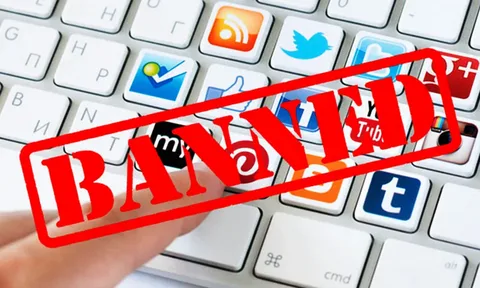Table of Contents
Social media bans
It is unclear how social media use affects young people’s mental health. Despite this, the U.S. Surgeon General, state legislatures, and Congress are still pushing for age restrictions and warning labels on YouTube, TikTok, and Instagram.
However, experts, pediatricians, and the National Academies of Sciences, Engineering, and Medicine warn that the focus on concerns about social media might blind legislators to the advantages it offers young people in terms of mental health.
The top physician in the country, Surgeon General Vivek Murthy, advocated for warning labels on social networking networks in June. On July 30, the Children and Teens’ Online Privacy Protection Act and the bipartisan Kids Online Safety Act were adopted by the Senate. Additionally, legislation pertaining to children and social media is in the works in at least 30 states. It includes requirements for parental approval, age restrictions, and new digital and media literacy classes for K–12 students.
The majority of studies indicates that some social media characteristics may be dangerous
The majority of studies indicates that some social media characteristics may be dangerous: Constant alerts divert attention and interfere with sleep, algorithmically generated material can propagate false information and distort reality, and the anonymity that these platforms afford might encourage cyberbullies.
However, Linda Charmaraman, a research scientist and the head of the Youth, Media & Wellbeing Research Lab at Wellesley Centers for Women, said that social media may also be beneficial for some young people.
Charmaraman’s research, published in the Handbook of Adolescent Digital Media Use and Mental Health, suggests that social media helps lessen isolation for young people who identify as LGBTQ+ and children of color, as well as those who might not feel that they are well represented in society. She said that because these marginalized groups use the networks more frequently, age limitations may disproportionately harm them.
“At first, you think, ‘That’s awful. We must stop them from doing it,” she said. “However, if you look into why they’re doing it, you’ll see that it gives them a sense of identity affirmation in times when real life is lacking.”
The 17-year-old Arianne McCullough claimed that she uses Instagram to interact with other Black students at Willamette University, where 2% of the student body is Black.
McCullough, a student from Sacramento, California, said, “I know how isolating it can be feeling like you’re the only Black person, or any minority, in one space.” Therefore, it’s crucial to have someone you can quickly text and say, “Let’s go hang out.”
At Willamette, in Salem, Oregon, McCullough formed a social network with other Black students after around a month. She said, “We’re all in a little group chat.” “We discuss and lay out plans.”
For McCullough, social media hasn’t always been this helpful. McCullough said she quit playing soccer and track after the outbreak forced California schools to close. She said that she put on weight and that she was often seeing at-home exercises and fasting diets promoted on social media.
“That’s when the body comparisons started,” McCullough stated, adding that she became increasingly agitated, preoccupied, and depressed. “I was making comparisons between myself and things that I wasn’t conscious of before,” the speaker said.
McCullough reacted angrily when her mother attempted to take away the smartphone. Her mother, 38-year-old Sacramento resident Rayvn McCullough, stated, “It was definitely addictive.”
Arianne claimed that after reducing her usage of social media, she gradually felt happier and more like herself.
But later, according to Arianne, the fear of missing out returned. “I missed having simple, quick communication with my friends and seeing what they were up to.”
More youth had been experiencing mental health issues for ten years prior to the COVID-19 epidemic, which prompted the American Academy of Pediatrics and other medical organizations to proclaim “a national emergency in child and adolescent mental health.”
The Centers for Disease Control and Prevention performed behavioral surveys of students in grades nine through twelve and found that a greater number of young people reported suicide thoughts and actions, along with feelings of hopelessness and depression.
The dilemma has been attributed to an increase in the usage of immersive social media, such as the never-ending scroll of videos on YouTube, TikTok, and Instagram. However, a national academies committee discovered that there may be both advantages and disadvantages to the complicated interaction between social media and young people’s mental health. The committee stated last year that there is still little proof of the impact of social media on children’s wellbeing and urged the National Institutes of Health and other organizations to finance these kinds of studies as a top priority.
Utah law passed last year that sets age and time restrictions on minors’ use of social media
The committee referenced a Utah law passed last year that sets age and time restrictions on minors’ use of social media in its report, but it also cautioned that the regulation may have unintended consequences.
The paper stated that it may be unintentional for lawmakers to separate young people from their support networks when they need them, in an effort to preserve sleep and study time as well as to stop at least some compulsive usage.
Policies that align with the national academies’ recommendations have been contemplated by several states. For example, laws requiring social media sites to default to privacy settings and outlawing the sale or disclosure of children’s personal data have been passed in Virginia and Maryland. The national academies also advised other states to develop courses on the negative impacts of social media use on kids’ mental health, such as West Virginia, Colorado, and Georgia.
The Kids Online Safety Act, now pending in the House of Representatives, would impose a “duty of care” on firms to safeguard users under the age of 17 against harm, such as depression, anxiety, and suicidal conduct, and would need parental approval for users of social media who are younger than 13. The Children and Teens’ Online Privacy Protection Act, the second measure, would forbid platforms from gathering personal information about youth and directing advertisements at minors.
Attorneys general from numerous states, including California, Louisiana, Minnesota, and many more, have sued in federal and state courts, claiming that Facebook’s parent company, Meta, ignored the potential harm to young people’s mental health while deceiving the public about the risks associated with social media use.
The majority of social media platforms mandate that users be at least 13 years old, and they frequently incorporate safety measures such as disallowing adults from texting children and putting minors’ profiles to private by default.

The Department of Justice claims that certain social media corporations violate their own guidelines, even in spite of current regulations. It filed a lawsuit against TikTok’s parent business on August 2nd, alleging that it had broken child privacy regulations by intentionally allowing minors under the age of 13 to access the site and collecting data about their usage.
According to surveys, Americans generally accept regulations for parental consent and age limitations.
An industry organization called NetChoice, which is made up of Meta and Alphabet, the company that controls Google and YouTube, has filed lawsuits against at least eight states in an attempt to block or overturn legislation that enforce age restrictions, verification requirements, and other child-protection-related regulations.
As to Jenny Radesky, a medical professional and co-director of the American Academy of Pediatrics’ Center of Excellence on Social Media and Youth Mental Health, a significant portion of social media’s impact may be attributed to the material kids watch and the features that captivate their attention on the site.
An industry organization called NetChoice, which is made up of Meta and Alphabet, the company that controls Google and YouTube, has filed lawsuits against at least eight states in an attempt to block or overturn legislation that enforce age restrictions, verification requirements, and other child-protection-related regulations.
As to Jenny Radesky, a medical professional and co-director of the American Academy of Pediatrics’ Center of Excellence on Social Media and Youth Mental Health, a significant portion of social media’s impact may be attributed to the material kids watch and the features that captivate their attention on the site.
She said that while initiatives like age restrictions, parental permission laws, and other measures have good intentions, they ignore “the real mechanism of harm,” which is the commercial structures that encourage young people to continue posting, browsing, and making purchases.
According to Radesky, “we’ve kind of created this system that’s not well designed to promote youth mental health.” “It’s intended to generate substantial revenue for these platforms.”
This research was assisted by Chaseedaw Giles, the editor of KFF Health News’ digital strategy and audience engagement.

